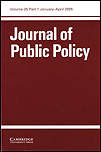
Politicians are motivated primarily by the desire to avoid blame for unpopular actions rather than by seeking to claim credit for popular ones. This results from voters' 'negativity bias': their tendency to be more sensitive to real or potential losses than they are to gains. Incentives to avoid blame lead politicians to adopt a distinctive set of political strategies, including agenda limitation, scapegoating, 'passing the buck' and defection ('jumping on the bandwagon') that are different than those they would follow if they were primarily interested in pursuing good policy or maximizing credit-claiming opportunities. These strategies in turn lead to important policy effects, including a surrender of discretion even when it offers important credit-claiming opportunities.